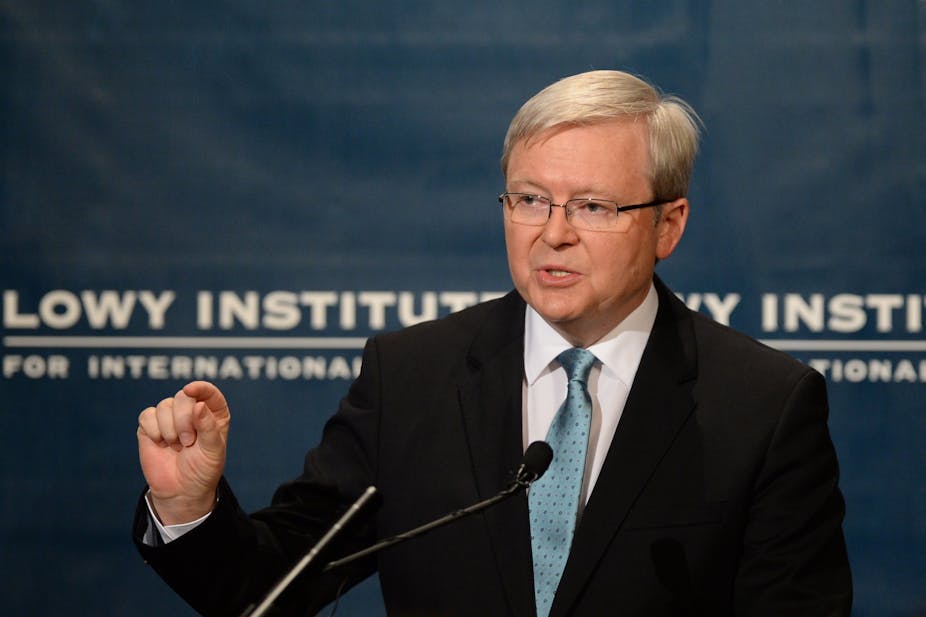A proposal to move some or all of the Garden Island naval base fleet from Sydney has been slammed as too costly and a blatant bid to shore up Labor support in Queensland.
In a speech to the Lowy Institute in Sydney, Kevin Rudd has that flagged a re-elected Labor government would consider relocating part or all of the base fleet to Queensland and other parts of Australia.
He said that he would appoint a task force to advise on the timing, proportions and implementation of shifting some or all of Fleet Base East to Queensland and Perth and developing, upgrading or expanding Darwin or Broome.
But Neil James, head of the Australia Defence Association, said this was “one of those silly ideas that occasionally arise in election campaigns”.
It was just not possible to move all of the fleet out of Garden Island, because “they’ve got nowhere to go”, James said. Relocating some of the Garden Island fleet would cost $6 billion; moving the entire base would carry a cost of $8-$10 billion, he said.
NSW Premier Barry O'Farrell said Rudd had been spooked by the polls and would do anything to save votes “north of the New South Wales border.”
O'Farrell and Rudd clashed when they encountered each other on their way to press conferences in Sydney, with O'Farrell telling Rudd a “phone call would have been nice.”
But Rudd said there would be military and economic advantages in relocating from Garden Island.
He said the 2012 Australian Defence Force Posture Review recommended the government consider an alternative location for Fleet Base East. It recommended planning a supplementary east coast fleet base at Brisbane for future submarine and large amphibious based ships. It also said defence should develop options to allow large amphibious based ships to embark army units based in Brisbane and, as a lesser priority, Adelaide, as well as Townsville and Darwin.
Rudd said the government would expect the relocation of fleet elements north and west to be completed by 2030.
Relocation would deploy the Navy’s most important ships “where they will be well-placed to protect Australia’s interests and quickly respond to challenges.” It would ensure that the ADF could carry out effective military operations in Australia’s north, by basing most of the Navy’s fleet close to key army units, the Prime Minister said.
The shift would also deliver economic benefits for NSW by opening up Garden Island to new uses, such as “greater public green spaces on Sydney’s foreshore, appropriate heritage protection, as well as possibly providing berths for the burgeoning cruise ship industry as a boon to Sydney’s economy”.
Rudd said such a move would create new jobs in Brisbane, Perth, Darwin, Townsville and Cairns. “The naval presence in those cities would be expanded, port facilities would be upgraded, generating opportunities for local business and industry in supplying and supporting the new naval bases,” he said.
Opposition leader Tony Abbott described the announcement as “more policy on the run driven by political imperatives”.
Abbott said he was not against shifting military assets over time, but it had to make sense in a budget environment and should be driven by military needs not political ones.
Rudd talks to Obama on “way forward” for Syria
Kevin Rudd also said he had spoken today to US President Barack Obama about the crisis in Syria, as well as talking in the last week to the Secretary-General of the United Nations Ban Ki-moon and President Hollande of France.
“We have discussed how to chart a way forward,” he said.
The international community was increasingly concluding that chemical weapons were used and that the Assad regime was in all probability responsible. If true, this would be crime against humanity and a violation of international law. It would not be without consequence. President Obama is considering options, Rudd said.
“Our priority remains working with all corners of the world through our global diplomatic network to ensure Assad allows full and unfettered access to UN inspectors.”

